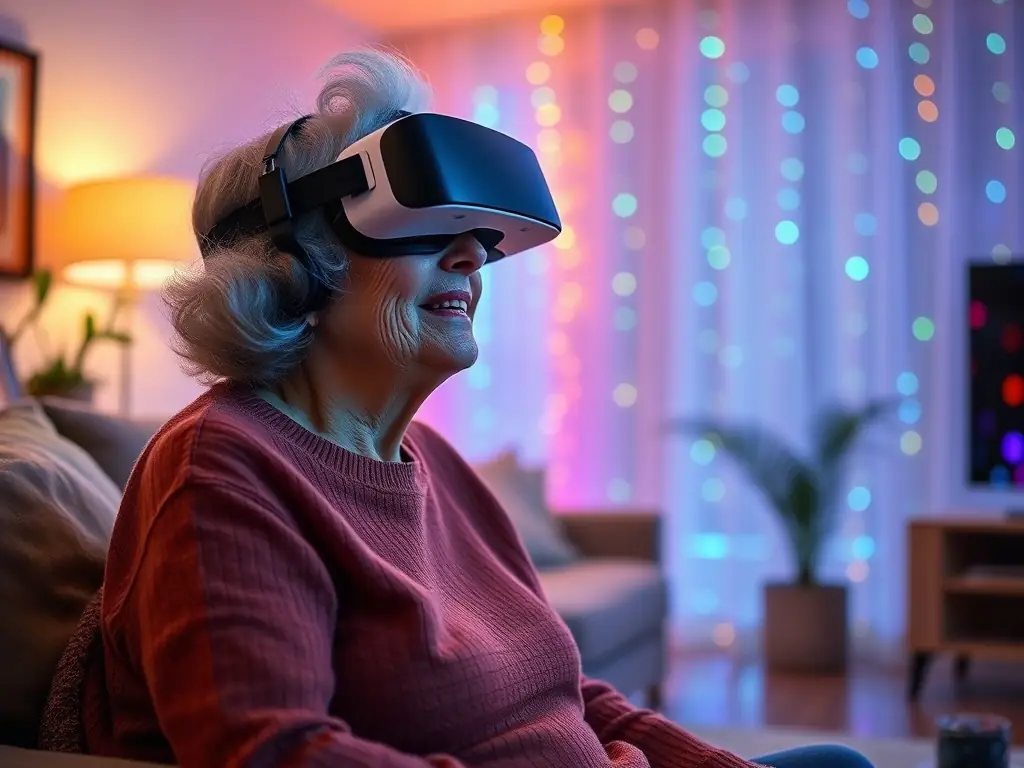Artificial intelligence (AI) is already helping many seniors live healthier, more independent lives—but what does the future hold? As technology continues to advance, AI will play an even greater role in ageing, offering new ways to make life easier, safer, and more enjoyable for older adults. Whether it’s through health monitoring, smart homes, or new ways to stay connected with loved ones, the future of AI promises exciting possibilities.
In this post, we’ll take a look at how AI might shape the future of ageing and what seniors can expect in the coming years. Don’t worry, though—there’s nothing to fear! These advancements are designed to be helpful, friendly, and easy to use.
1. Smarter Health Monitoring and Early Detection
Imagine a world where your health is being quietly monitored in the background, and you only need to see the doctor when something unusual comes up. That’s the direction AI-powered health monitoring is heading. Smartwatches, wearable devices, and even AI sensors embedded in clothing or home furniture could continuously track things like your heart rate, blood pressure, and even how well you’re sleeping.
In the future, AI will become even better at detecting potential health issues early on, alerting both you and your doctor if something needs attention. This means fewer trips to the doctor’s office and more proactive care.
What to Expect: Smarter health monitoring that helps detect problems early, making it easier to manage your health from the comfort of home.
2. AI-Powered Personal Assistants for Daily Life
In the coming years, AI personal assistants like Alexa, Google Assistant, or even more advanced versions of these tools will become even more helpful. Imagine an AI assistant that not only reminds you to take your medication but also helps with meal planning based on your dietary needs, keeps track of your appointments, and even suggests gentle exercises tailored to your fitness level.
These assistants will become more conversational, understanding your preferences and routines better over time. It’ll be like having a personal helper who knows exactly how to support your lifestyle.
What to Expect: AI assistants that are even more intuitive, offering support with everything from daily tasks to health management, all through simple voice commands or a smart device.
3. Smart Homes That Care for You
We’re already seeing the rise of smart homes, but in the future, these homes will be even more intelligent. AI will power homes that can adjust the lighting, temperature, and security based on your preferences, all without you lifting a finger. In the future, smart homes might include:
- AI-driven sensors that detect if you’ve fallen and send help automatically.
- Kitchens with smart appliances that remind you to take food out of the oven or suggest easy recipes based on what’s in your fridge.
- Automated cleaning systems, like smart vacuums and even robotic companions that help with simple chores.
These homes will be designed to support ageing in place, making it easier and safer for seniors to live independently.
What to Expect: Smarter homes that adapt to your needs and make daily life more comfortable, safe, and convenient.
4. AI for Mental and Emotional Well-Being
As we age, staying mentally and emotionally engaged is just as important as staying physically active. AI tools will continue to evolve to support mental well-being, offering personalised games, learning apps, and even virtual companions to keep you mentally sharp and socially connected.
In the future, AI might:
- Create personalised brain exercises based on your cognitive needs, helping to keep your mind sharp.
- Use virtual reality (VR) to let you experience new places or revisit memories from your past.
- Offer emotional support through AI-powered companions that can chat with you, offer encouragement, or provide guidance.
These tools will help reduce loneliness and keep your brain active, all while providing easy-to-use entertainment and companionship.
What to Expect: AI-powered tools that support mental wellness, offering personalised experiences to keep you sharp and connected to the world.
5. Telemedicine and Virtual Healthcare Visits
Telemedicine is already growing in popularity, but in the coming years, it will become even more accessible and effective. AI-powered telemedicine platforms will make it easier to connect with doctors, get prescriptions, and manage chronic conditions without leaving your home.
AI might also assist doctors by analysing your medical data and offering suggestions for treatment, ensuring that you get the best care possible. Virtual healthcare visits will be faster, more personalised, and more effective, giving you access to healthcare professionals anytime you need them.
What to Expect: Easier, more efficient access to healthcare through virtual visits, with AI assisting doctors to provide better care.
6. Transportation Made Easier with AI
In the future, AI-powered transportation could change how seniors get around, especially for those who no longer drive. Self-driving cars are on the horizon, and they could offer a safe and reliable way for seniors to stay mobile, whether it’s running errands, visiting friends, or attending appointments.
AI-driven ride-hailing apps like Uber and Lyft are already available, but they will become even easier to use, with services tailored to seniors’ needs, offering door-to-door assistance and ensuring comfort along the way.
What to Expect: AI-powered transportation that offers independence and freedom, allowing seniors to travel safely and easily without relying on others.
7. Staying Connected with Loved Ones
One of the greatest challenges of ageing can be staying socially connected, especially if family and friends live far away. AI will continue to make it easier to stay in touch through video calls, virtual gatherings, and even AI-powered social platforms.
In the future, you might be able to use augmented reality (AR) or virtual reality (VR) to interact with loved ones in a more immersive way, almost as if you’re sitting in the same room together. AI can also help you stay informed by curating news or social updates that matter most to you.
What to Expect: Advanced communication tools that keep you connected with loved ones, no matter where they are, making it easier to share experiences and stay in touch.
Conclusion: The Future Looks Bright with AI
The future of AI and ageing is exciting, with so many new tools and technologies designed to make life easier, healthier, and more enjoyable. From smarter health monitoring to homes that care for you, AI will offer seniors greater independence, safety, and comfort in the years to come. And the best part? These advancements are being made with simplicity in mind, so you don’t need to be a tech expert to enjoy them.
So, what should you expect? A future where AI works behind the scenes, helping you live life to the fullest—whether that’s staying active, keeping in touch with family, or enjoying your favourite hobbies. The future of AI and ageing is all about making sure you can live your best life, with a little help from technology!


No responses yet